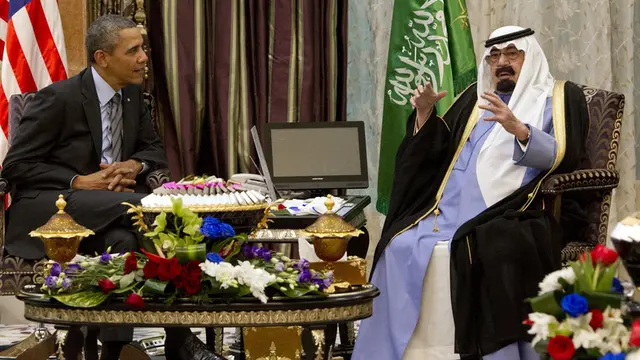The ongoing visit of U.S. President Barack Obama to Saudi Arabia aims to reassure the oil-rich Gulf state amid increasingly strained relations between Washington and Riyadh, said political experts.
The U.S.-Saudi relations saw growing tense after the recently U. S.-sponsored Western-Iranian deal that relieves the Islamic Republic from sanctions and conditionally allows its nuclear activities.
"The visit is surely important as he addresses the most important power in the Gulf region. The visit basically aims to reassure the Gulf states after the Western deal with Iran due to fears over Iranian nuclear expansion in the region," said said Abdel-Raouf al-Reedy, former Egyptian ambassador to the United States and head of the Egyptian Council for Foreign Affairs.
In April 2015, Iran and six world powers, including the United States, Russia, China, Britain, France and Germany, reached an initial agreement to limit Iran's nuclear activities for a specific period in return for relieving the economic sanctions imposed on Iran over its nuclear program.
"The Gulf states, especially Saudi Arabia, are also concerned about Iran's regional economic strength after it would restore over 100 billion U.S. dollars of its frozen funds due to the deal, " the ex-ambassador told Xinhua.
As the U.S. Congress attempts to issue a bill to allow suing Saudi Arabia over alleged involvement in September 11 terror attacks on New York city, Obama's visit also aims to cool down Riyadh in this regard.Before heading to Saudi Arabia,
Obama voiced rejection of the anti-Saudi bill, which the Arab powerhouse threatened to sell off its billions in U.S. assets if passed.
"Some congressmen attempt to do that but I don't think such a bill will be passed or activated on the ground," Reedy told Xinhua, "Washington and Riyadh cannot do without each other."
Although Obama seeks to assure the Saudis regarding Iran, some experts believe that Washington still wants to deal with the Shiite, Persian country due to its influence in the Syrian conflict.
"The Americans seem to be willing to modify their course in the Middle East to create a balance between their relations with the Sunnis and the Shiites in the region, and may eventually change their vision on Syria," said Hani Khallaf, political expert and Egypt's former assistant foreign minister for Arab affairs.
The ex-diplomat expects the United States, due to its approach with Iran, to accept a solution that includes "temporary presence" of Syrian leader Bashar al-Assad and allow Iranian presence in Iraq and Lebanon "provided it wouldn't cause military or security tension in the region."
"Oil is the basis for the whole issue, as oil is so essential for the United States," Khallaf told Xinhua, stressing that U.S. -Gulf ties allowed Washington to establish large military bases in the region, "which is a great advantage for the Americans too."
He said that the United States seeks to guarantee "Israeli safe existence" in the Middle East region by maintaining balanced ties with the Gulf states and Iran at the same time.
The United States is currently busy with preparations for the upcoming presidential elections in November and Obama's outgoing administration is unlikely to make real change in the U.S. foreign policy for the time being.
"Obama's visit to Saudi Arabia is for reassurance about Iran in the first place, yet his administration is going through a 'lame duck' stage and so it cannot make a significant change in the U.S. policy in the Arab world," said Saeed al-Lawindi, political researcher and expert of international relations at Cairo-based Al-Ahram Center for Political and Strategic Studies.
Obama's visit to Riyadh coincided with a brief visit of his Secretary of State John Kerry to Cairo, which Lawindi sees as relevant due to Saudi King Salman bin Abdeulaziz's recent lengthy visit to the Egyptian capital city.
"Perhaps both visits also seek to gather information about Saudi-Egypt deals amid ongoing regional tension," the expert told Xinhua.
The expert concluded that despite the tense U.S. relations with the Gulf states in general and Saudi Arabia in particular, the United States perceives the oil-rich country as "a chicken that hatches golden eggs," and therefore it does not plan to give up on it. Enditem
 简体中文
简体中文

